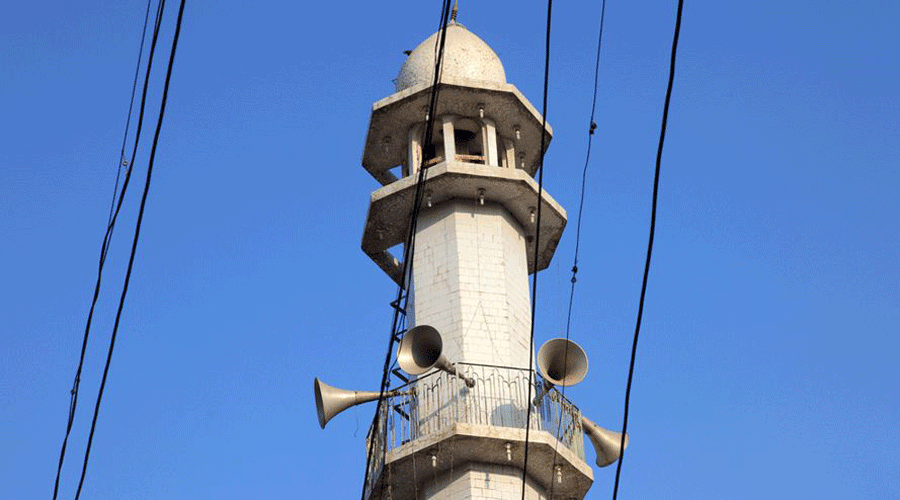Sangh parivar outfit Sree Ram Sena on Monday launched its threatened Karnataka-wide protest against the use of loudspeakers for azan, singing the Hanuman Chalisa and other bhajans over microphones at temples coinciding with the morning prayer time at mosques.
While azan was sounded around 4.40am on Monday and lasted the usual minute or two, the Sena’s programme stretched from 4am to 5am.
Karnataka has over the past few months witnessed a hijab ban at colleges, and its BJP government has silently watched Sangh parivar outfits call for a boycott of halal food and temples ban minority shopkeepers from their vicinity.
On Monday, chief minister Basavaraj Bommai met senior police officers and the advocate-general to discuss the Sena protest and received a Congress delegation that urged him to maintain peace and harmony.
Sena chief Pramod Muthalik led the singing at a Mysore temple and warned the protest would continue till the state government stopped mosques from using loudspeakers for azan.
Muthalik had threatened bhajans over loudspeakers five times a day in tandem with azans, but on Monday the Sena protested only once, in the early morning.
“Our members sang the Hanuman Chalisa and other hymns using loudspeakers at temples in Bangalore, Bidar, Gulbarga, Bagalkot, Gadag, Hubli-Dharwad, Dakshina Kannada, Chikmagalur, Kolar and Tumkur. We will sing bhajans at more temples as this is not a one-day protest,” the outfit’s state general secretary, Anand Shetty, told The Telegraph.
He added: “We are not against azan; we are only against the use of loudspeakers for azan.”
Shetty cited a Supreme Court order against the unrestricted use of loudspeakers from 10pm to 6am.
Told that the Sena was flouting the court order too by using loudspeakers to sing bhajans, Shetty said the outfit wanted a level playing field. “If Muslims are allowed to use loudspeakers, we want the same right. Otherwise let the government get everyone to follow the rules,” he said.
Maulana Mohammed Maqsood Imran, chief imam of the Juma Masjid of Bangalore, had earlier clarified that most of the state’s 12,000-odd mosques had been fitted with the decibel controller, a small gadget with pre-set volume levels for daytime and night-time.
The apex court had cited the Noise Pollution (Regulation and Control) Rules, 2000, in prescribing decibel levels for night-time and daytime.
An advocate, Sumangala A. Swamy, said the Supreme Court order “is only about containing noise pollution and does not mention any religion”.
“The law is clear that everyone, including places of worship, must get permission to use loudspeakers. And such permissions are only for a limited number of days and not perpetual,” Swamy said.
She said permission for loudspeakers could given only for 6am-to-10pm use, subject to a decibel limit of 52, while there can be no permission to use loudspeakers between 10pm and 6am.
The Congress team that met Bommai included the deputy leader of the Opposition in the Assembly, U.T. Khader, Shantinagar MLA N.A. Haris, member of legislative council Nazeer Ahmed and Rajya Sabha member Syed Naseer Hussain.
“Everyone will follow government orders based on court rulings to contain noise pollution. We told the chief minister to take steps to maintain peace and harmony as some communal elements are taking the law into their own hands,” Khader told reporters.
The leader of the Opposition in the legislative council, B.K. Hariprasad of the Congress, demanded that those who participated in the Sena protest be booked under the anti-terror law UAPA.











